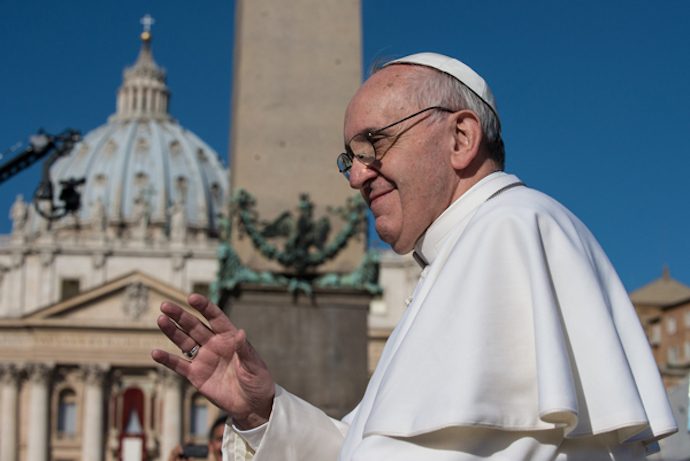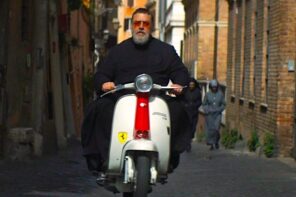Unlike many of his fellow world leaders, Pope Francis had a good 2016. His emphasis on humanitarian kindness in a time of increasing political turbulence has been warmly received by many liberal observers, eager to find a source of hope in uncertain times. In particular, Francis’s statements on climate change, the migration crisis and the shortcomings of unfettered capitalism, and border walls, along with his obliquely progressive statements on social issues such as homosexuality and abortion, have won him continued plaudits in the secular media.
In an editorial on New Year’s Day, for example, the Guardian praised Pope Francis as a “champion of humanity,” outlining his paradoxical status as the defender of progressive causes now under attack around the world. Similarly, in a piece for the American Prospect, Alexander Görlach touted Francis as “A Sacred Populist,” lauding him for breaking with conservatives and preaching a simple message of acceptance in times of great political upheaval and conflict. Liberals have had all the more reason to rally behind the pope since the beginning of Trump’s presidency, as White House chief strategist Steve Bannon has allied with Francis’s bitterest opponents in an attempt to export his political revolution to the Vatican.
Pope Francis’s willingness to constructively engage with the problems of the modern world has been enhanced by his humble persona, evident from the very beginning of his papacy, when he took his name in honor of St Francis of Assisi, and refused to wear the traditional ornate papal robes in favor of a simple white cassock.
Since then, the pope’s awareness of the importance of image has been demonstrated time and again by his media-friendly statements (which often break from Church orthodoxy more in style than substance), and in 2015 he established the Vatican Secretariat for Communications to streamline all of the Holy See’s media and public relations activities.
But while he has done much to rehabilitate the secular reputation of the papacy (if not the Church as a whole) in his nearly four years as pope, Francis’s tenure has reaped little so far in terms of fundamental reforms at the notoriously conservative Roman Curia. For any pope, the key to securing a lasting legacy lies in the appointment of likeminded Church officials to continue promoting his values during and after his pontificate, both in the College of Cardinals and at key departments in the Vatican’s bureaucratic machinery.
Pope Francis has gone further than most popes in attempting to shake up the Curial status quo, making bureaucratic reform a key issue of his pontificate. For the last three years, he has used his annual Christmas address to the Curia to criticize those who oppose his reforms, and to emphasize the necessity of institutional change if the Church is to successfully adapt to the contemporary world.
Indeed, without significant institutional change, the next pope could easily reverse Francis’s cautiously progressive tone, as swiftly as he himself wiped away much of the bitter taste of the austere Benedict XVI’s difficult pontificate. An insightful New York Times article in November highlighted how easily Pope Francis’s gains could be reversed, detailing the race against time he faces to ensure that his vision for the Church survives his death or resignation, by appointing enough liberal cardinals to elect a successor with priorities close to his own.
Seventy-seven of the 121 cardinals currently eligible to vote in the next conclave were appointed by Benedict XVI and John Paul II, most of them as conservatively minded as their patrons. Of these 77 men, 25 will turn 80 in the next five years, rendering them ineligible to vote in a conclave and creating more vacancies for cardinals sympathetic to Pope Francis’s worldview. However, if the next conclave occurs before the electoral balance shifts in favor of Francis’s diverse additions to the College of Cardinals, a majority of traditionalist clerics could once again anoint a staunchly conservative pope, eager to revert to the theological tone of his two immediate predecessors.
Electoral arithmetic aside, Pope Francis took a major step towards putting his stamp on the workings of the Curia itself on 1st January, when the newly formed Dicastery for Promoting Integral Human Development formally began its work. Announced in August 2016 in his Humanam Progressionem, a document that attracted little attention in secular media outlets, the new department merges the work of four pontifical councils established during the Vatican II era, encompassing the briefs of justice and peace, migration, humanitarian relief, and healthcare workers (no small task in an organization that still nominally oversees more than a quarter of the world’s healthcare facilities).
The Dicastery for Promoting Integral Human Development draws together Pope Francis’s main priorities under one roof, and the importance he attaches to its success is clear from his choice to lead the initiative. Peter Turkson, a (relatively) young, liberal Ghanaian cardinal and strong future contender for the papacy, has been named Prefect of the Dicastery, while the pope has indicated that he will “temporarily” lead the Vatican’s work on migration and refugee issues himself. This will provide a strong platform for Francis to continue his outspoken advocacy on pressing global issues, now backed up, at least in part, by the institutional weight of the Curia.
Thus, while the doctrinally rigid Benedict XVI’s power base lay in the vehemently traditionalist Congregation for the Doctrine of the Faith (founded in the sixteenth century as the Roman Inquisition to root out heretics), the Dicastery for Promoting Integral Human Development may well provide a strong support base for Francis’s emphasis on humanity, tolerance and understanding, even after his own pontificate ends.
Even if the conservative camp still holds an electoral majority at the next papal conclave, Pope Francis has at least begun to institutionalize his legacy within the Vatican bureaucracy, complete with a popular papabile leading the charge as he seeks to further secure his vision for the Church’s role in the world in 2017.





